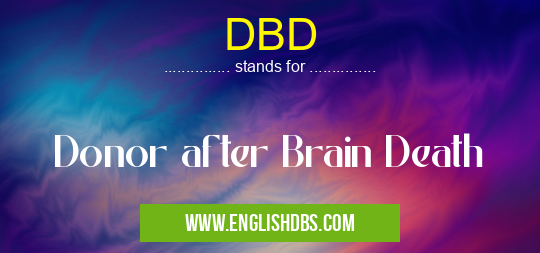What does DBD mean in SURGICAL
DBD stands for Donor after Brain Death, a term used in the medical field to refer to individuals who have suffered irreversible loss of brain function and are eligible to donate their organs and tissues for transplantation. This donation process involves retrieving organs from the deceased donor and transplanting them into suitable recipients who are in need of life-saving treatments.

DBD meaning in Surgical in Medical
DBD mostly used in an acronym Surgical in Category Medical that means Donor after Brain Death
Shorthand: DBD,
Full Form: Donor after Brain Death
For more information of "Donor after Brain Death", see the section below.
Meaning of DBD in MEDICAL
In the context of medical terminology, DBD has a specific meaning:
- Donor: The individual whose organs and tissues are donated.
- After: Indicates that the donation occurs after the donor has suffered brain death.
- Brain Death: An irreversible loss of all brain function, including the brainstem, which controls vital functions such as breathing and heartbeat.
Full Form of DBD
DBD is an abbreviation that stands for Donor after Brain Death.
What does DBD Stand for?
DBD stands for Donor after Brain Death, which refers to individuals who have suffered irreversible brain death and are eligible to donate their organs and tissues for transplantation.
Final Words: DBD plays a vital role in organ and tissue transplantation, providing life-saving opportunities for individuals suffering from end-stage organ failure. The ethical and medical considerations surrounding DBD ensure that organ donation occurs with the utmost respect for the donor and their family. Understanding the meaning and implications of DBD is crucial for promoting awareness and facilitating ethical and transparent transplantation practices.
DBD also stands for: |
|
| All stands for DBD |
